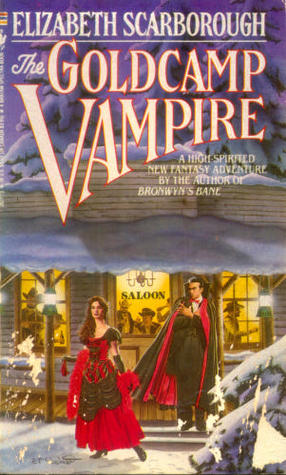Hooray! Another one off the shelf for your enjoyment. Neither my husband or me cop to buying this. I mean, look at the cover.

This has no elements that would entice my husband. It’s bright. It’s colorful. No one is immediately dying. (My husband tends towards darker fantasy.)
But I dislike vampires. A lot. I so rarely pick up any sort of media that includes them, and there one is, right in the title.
(It probably was me. But what was I thinking?)
Maybe I thought it would be a romp. I do like romps.
Anyway! I bought this book at a library book sale in 2015 and now I have read it, and we can talk about it.
Title: The Goldcamp Vampire
Author: Elizabeth Scarborough
Genre: Historical fantasy
Publication Year: 1987
Pros: Occasional fun capers and no one cares about there being a vampire, not even the Mounties
Cons: Wanting to beat viewpoint character over the head with something
I wanted to like this a lot more than I did. It’s fairly ridiculous, and no one’s fooling anyone, and also no one cares and it’s glorious. But I felt like the prose was dense and I admit to skimming when it got bogged down in description, and I wasn’t too fond of the main character, who often couldn’t see the forest for the trees.
(Goodreads includes a longer title: The Goldcamp Vampire, or the Sanguinary Sourdough, though I’m not sure where sourdough comes into it.)
This is also the second book in the series, the first being The Drastic Dragon of Draco, Texas. I have not read that book or this author previously.
Pelagia Harper, also known as Valentine Lovelace (author), has recently lost her father, so when his mistress offers her a chance to make a new life in the Yukon, she goes along with it, thinking she’ll at least have a good story to tell. There is a weird addition to the party, however–they’ll need to escort the coffin of the mistress’s new employer’s former partner with them.
By the time they reach their end destination, several people around them have died seemingly randomly, and Pelagia/Valentine has been implicated in at least one of their murders. So the mistress and her employer insist on hiding her in plain sight by dying her hair and making her a flamenco dancer at their saloon, answering to the name of Corazon and speaking no English.
So you can see what sort of book this is. I wish I had liked Pelagia/Valentine better. Besides the name confusion (as she rarely thinks of herself by name, and those around her have practically half-a-dozen names she’s referred to), she’s older (in her ’30s), an author, has dealt with supernatural creatures previously, and isn’t afraid to go to other people’s rescue. I should like her. But I didn’t. Nor was I too wild about most of the side characters, of which there are a couple dozen, which are sometimes hard to keep track of. I did like Larsson, Lomax, and Jack London, and occasionally Vasily Vladovitch. Oh, and the cat.
I dunno. I’d give it a 3 out of 5 stars. So not good, but not bad. If you like romps involving the Yukon, the Gold Rush, and vampires, hey, here’s a book for you. There’s also a were-moose.
Read anything else by Elizabeth Ann Scarborough? Would you recommend anything?








